Class 10 Exam > Class 10 Notes > History for GCSE/IGCSE > The Importance of the Nazi–Soviet Pact
The Importance of the Nazi–Soviet Pact | History for GCSE/IGCSE - Class 10 PDF Download
| Table of contents |

|
| The USSR's Aims for the Nazi-Soviet Pact |

|
| Germany's Aims for the Nazi-Soviet Pact |

|
| Terms of the Nazi-Soviet Pact |

|
| Other Alliances - The Pact of Steel |

|
The USSR's Aims for the Nazi-Soviet Pact
- The Nazi-Soviet Pact, also known as the Molotov-Ribbentrop Pact, was a non-aggression treaty signed between Nazi Germany and the Soviet Union.
- It was signed on August 23, 1939, just before the outbreak of World War II, and it shocked the world due to the unexpected alliance between two ideological foes.
- One of the main aims of the pact for the USSR was to secure its western borders and buy time to prepare for a potential conflict.
- By signing the pact, the Soviet Union aimed to avoid a two-front war, which had severely weakened it during World War I.
- The agreement included a secret protocol that divided Eastern Europe into spheres of influence between Germany and the Soviet Union.
- This pact allowed the Soviet Union to expand its influence and territory westward, gaining control over parts of Poland, the Baltic states, and Finland.
- Furthermore, the pact provided the USSR with valuable resources and technology from Germany, enhancing its industrial and military capabilities.
- However, the pact was a temporary arrangement, as Hitler eventually broke the agreement by invading the Soviet Union in June 1941, leading to the Eastern Front of World War II.
Why Did Stalin Sign the Pact?
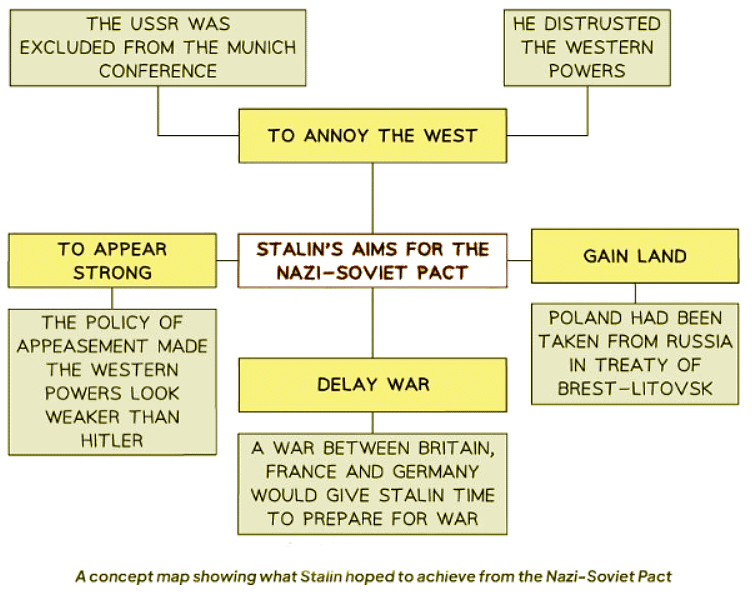
Germany's Aims for the Nazi-Soviet Pact
Hitler approached Stalin on 20th August to propose the pact, which was unexpected due to several reasons:
- The USSR had a significant Jewish population.
- There was a widespread, albeit inaccurate, belief that numerous Soviet communists were Jewish.
- Hitler viewed the Slavs, Eastern European inhabitants, as subhuman.
- Expansion into Soviet territory was crucial to fulfill Hitler's foreign policy goal of Lebensraum.
Why Hitler Signed the Pact?
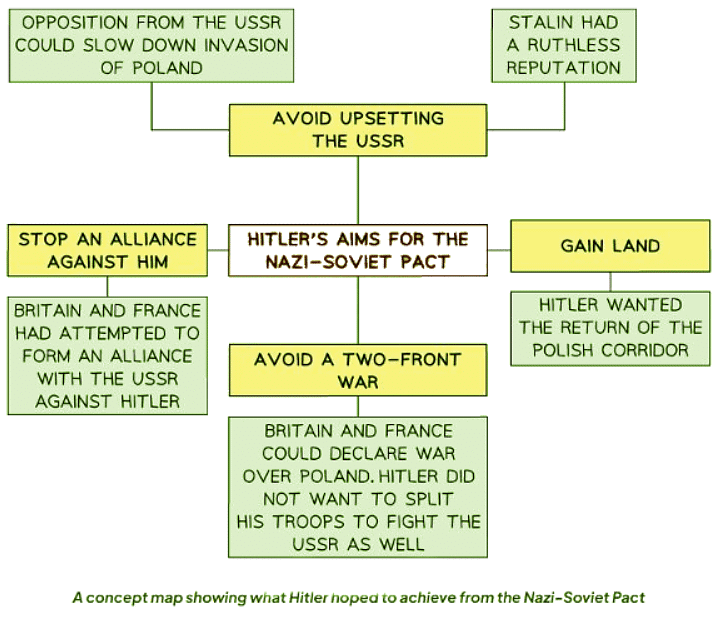
Question for The Importance of the Nazi–Soviet PactTry yourself: What was one of the main aims of the USSR in signing the Nazi-Soviet Pact?View Solution
Terms of the Nazi-Soviet Pact

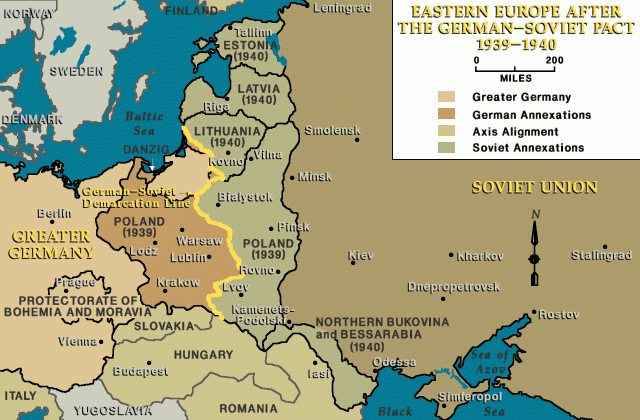
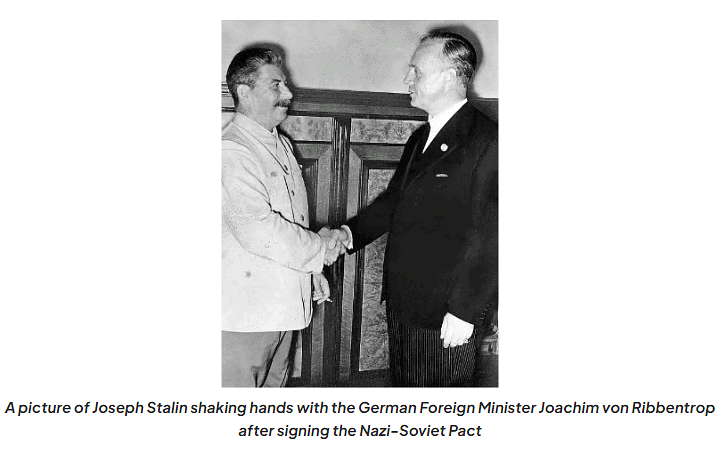
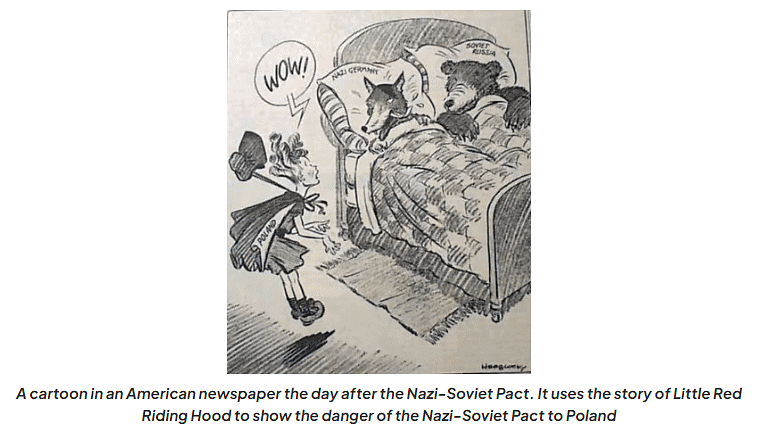
Other Alliances - The Pact of Steel
In 1939, Germany and Italy formed a formal alliance known as the Pact of Steel.
- The official name of this alliance is the Pact of Friendship and Alliance.
- Prior to this, in 1936, the two nations had signed a friendship treaty called the Rome-Berlin Axis.

How Did Other Alliances Influence the Nazi-Soviet Pact?
- Stalin grew increasingly concerned about the rise of Fascism.
- Japan was a long-standing adversary of Russia.
- Japan had defeated Russia in the 1904 war.
- Japanese-controlled Manchuria shared a border with the USSR.
- The Nazi-Soviet Pact provided Stalin with temporary protection from Japan and Germany.
- Japan was a long-standing adversary of Russia.
- However, the pact was destined to fail.
- The Anti-Comintern Pact demonstrated Hitler's opposition to Communism.
- In 1941, Hitler violated the Nazi-Soviet Pact by invading Russia in Operation Barbarossa.
The document The Importance of the Nazi–Soviet Pact | History for GCSE/IGCSE - Class 10 is a part of the Class 10 Course History for GCSE/IGCSE.
All you need of Class 10 at this link: Class 10
|
79 videos|87 docs|18 tests
|
FAQs on The Importance of the Nazi–Soviet Pact - History for GCSE/IGCSE - Class 10
| 1. Why was the Nazi-Soviet Pact important in the context of Cambridge (CIE) IGCSE History? |  |
Ans. The Nazi-Soviet Pact is important in Cambridge (CIE) IGCSE History as it marked a significant turning point in World War II, impacting the balance of power in Europe and leading to the invasion of Poland.
| 2. What were the USSR's aims for signing the Nazi-Soviet Pact? |  |
Ans. The USSR's aims for signing the Nazi-Soviet Pact included securing its western borders, gaining time to modernize its military forces, and potentially expanding its influence in Eastern Europe.
| 3. How did the Versailles Settlement and the Polish Corridor contribute to the signing of the Nazi-Soviet Pact? |  |
Ans. The Versailles Settlement and the Polish Corridor created tensions between Germany and Poland, leading Hitler to seek a non-aggression pact with the USSR to prevent a potential two-front war.
| 4. How did Hitler and Stalin's belief systems influence their decision to sign the Nazi-Soviet Pact? |  |
Ans. Hitler's belief in Lebensraum and the superiority of the Aryan race motivated him to seek territorial expansion, while Stalin's focus on strengthening the Soviet Union's defenses and maintaining security influenced his decision to align with Germany temporarily.
| 5. What were Germany's aims for signing the Nazi-Soviet Pact and how did Hitler view Slavs in this context? |  |
Ans. Germany's aims for signing the Nazi-Soviet Pact included preventing a two-front war and gaining a free hand to invade Poland. Hitler viewed Slavs as inferior and believed in their subjugation to further his expansionist goals.
Related Searches














